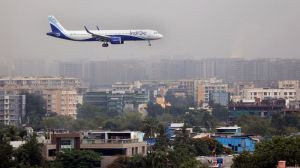Govt signals RBI: No need to hike rates
The Finance Ministry has opposed tightening of money supply and has recommended administrative steps,including abolishing import duties...
The Finance Ministry has opposed tightening of money supply and has recommended administrative steps,including abolishing import duties on identified essential commodities and food products for the time being,to curb rising inflation.
Considering that the high level of inflation is currently confined to food items,possibly there is nothing special which can be done on the demand side. We should be prepared to use generalized measures such as tightening liquidity through calibrated increase in cash reserve ratio and policy rates only in the event of the current food price inflation escalating into a general inflation, Finance Secretary Ashok Chawla said in a proposal for the Cabinet Committee on Prices which is likely to meet this week.
Chawlas recommendation,which has the approval of Finance Minister Pranab Mukherjee,is valuable for companies and consumers dependent on bank credits as well as investors here and abroad who are looking at stock market corrections in case a tight money supply is adopted by the central bank when it meets to review the monetary policy on January 29.
Economists are expecting that high inflation and strong economic growth may prompt the Reserve Bank of India to shield India from the global recession by reversing the record cuts in interest rates made between October 2008 and April 2009.
While Prime Ministers Economic Adviser C Rangarajan last week said some tightening was required to moderate price expectations,RBI Deputy Governor Shyamala Gopinath hinted the use of tight monetary policy to contain peoples inflationary expectations.
Inflationary contribution of the food index has been easing after touching 19.95 per cent in the week ended December 5,the highest since December 1998. The year-on-year rise of the index slipped to 19.83 per cent in the week ending December 19 and further to 18.22 per cent in the week ending December 26 as costs of some food items softened.
The Ministrys suggestion is that while abolishing the import duties on commodities of concern,the government must release more rice and wheat in the open market,impose stock limit on imported food and direct distribution agencies to purchase fruits and vegetables directly from the growers for sale to consumers.
In order to augments supplies,all import duties may be suspended for the time being,may be till the end of the current financial year, says the proposal which identifies rice,wheat,pulses,potatoes,onions,fruits,milk,mineral oils,sugar and oil cakes as the commodities of concern.
To improve the supply situation of wheat and rice and also to curtail the sentiments of shortage of foodgrain,there is need for Food Corporation of India to play a very active role… FCI should be encouraged to make Open Market Sales in relatively small lots to prevent big traders from buying and then hoarding, it says.
The Ministry recommends strict implementation of the stock limit notified for different foodgrain,including sugar,with similar stock limit imposed on imported items at the port or at the mills ahead of processing. It would help in quick delivery of imported items to the market.
It suggests releasing coarse cereals from the central stocks and importing oilcake and other forms of animal feed to contain the price rise in milk and milk products. Government may also consider banning the export of milk products, it adds.
Also,states would be advised to direct their civil supplies department or agencies like NAFED,Mother Dairy or Delhi Milk Scheme to procure fruits and vegetables directly from the growers and sell them to retail consumers through their outlets.
States would also be asked to reduce commission and duties paid by growers at the mandis for some time as these add to the retail price. This will have an immediate impact on the prices, it says.
In order to promote public and private companies to enter retail trade of essential food items,states would be advised to give them incentives so that they could push high turnover at low profit margins instead of high margins and low volumes done by the small traders who control retail trade.
- 01
- 02
- 03
- 04
- 05






























